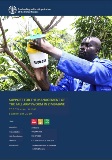TCP and Gender
Persisting inequalities between women and men are a major obstacle to agricultural and rural development. Eliminating these disparities are essential to building sustainable, inclusive food systems and resilient, peaceful societies.
FAO’s Policy on Gender Equality is centered on women having:
1. An equal voice and decision-making power
2. Equal rights, access and control over resources
3. Equal rights and access to services, markets and decent work
4. A reduction of their work burden
All projects approved under FAO’s Technical Cooperation Programme (TCP) apply the Gender Equality Policy as a key consideration in project design and implementation.
A TCP-specific gender Key Performance Indicator (KPI) is part of the 15 Minimum Standards for gender mainstreaming and women-specific targeted interventions, as defined by the FAO Policy on Gender Equality. The Standards aim to foster an enabling institutional environment by supporting the establishment of gender mainstreaming mechanisms which focus on the key functions of the Organization.
The KPI foresees that at least 60 percent of TCP projects contribute to gender equality in their implementation or have a specific gender focus. For TCP project approved against 2022-23 the share was 85 percent, and the remaining 15% were classified as having no human or social component.
Gender markers suggest that a large majority of TCP projects are mainstreamed. Here below there are examples of positive efforts being made to improve gender equality and women’s empowerment through TCPs.
Multi-Media
Latest TCP and Gender Publications

SUPPORT FOR THE MANAGEMENT OF THE FALL ARMYWORM IN ZIMBABWE
09/2019
Fall armyworm, Spodoptera frugiperda (Lepidoptera: Noctuidae) is one of the most important pests of maize production worldwide. It is a highly polyphagous migratory species that can colonize over 80 different plant species from 26 families



